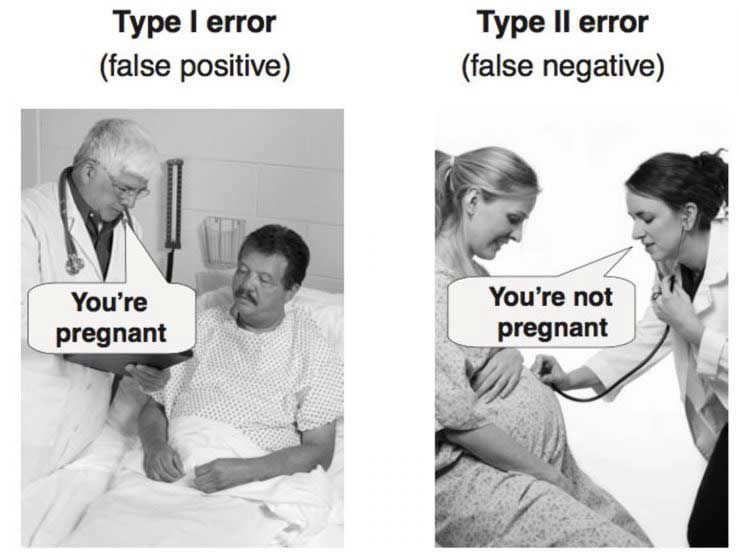Type 1 and Type 2 Errors
Are You Positive You Know the Difference?
From "Essential Guide to Effect Sizes" by Paul D. Ellis (2010)
Most psychology students will be introduced to the concept of Type 1 and Type 2 errors in a statistics class.
- A Type 1 error, also known as a false positive, occurs when a null hypothesis is incorrectly rejected.
- A Type 2 error, also known as a false negative, arises when a null hypothesis is incorrectly accepted.
The aim of this post is to explore a couple of quick ways in which psychology instructors can make sure their students don't confuse Type 1 and Type 2 errors, and in doing so extend their understanding of null hypothesis significance testing.
One very simple way of understanding the difference between Type 1 and Type 2 errors is to think about erroneous test results. As clearly illustrated in the pregnancy example above.
Keep It Real
Another great way is to provide a 'real world' perspective. Larry Gonick does an excellent job of doing this in his book - The Cartoon Guide to Statistics -, in which he suggests that we think of hypothesis testing/significance tests in terms of a smoke detector in our home. Gonick notes that household smoke-detectors tend to go off every time "you make the toast too dark" and this is a Type 1 error (an alarm without a fire) as opposed to a Type 2 error (a fire without an alarm). Adding that:
Every cook knows how to avoid a Type 1 error: Just remove the batteries. Unfortunately, this increases the incidence of Type 2 errors!
Teaching Ideas
ACTIVITY SUGGESTION:
Outline Gonick's smoke alarm example and then get your students to come up with their own real world illustration of the difference between Type 1 and Type 2 errors. This task works best when students are divided into small groups. Not only does this allow students to bounce ideas off each other but it also means you can get each group to present their example to the rest of the class. You might also want to get the class as a whole to decide which is the best example and why.
ADDITIONAL QUESTIONS/TASKS:
How does the issue of Type 1 and Type 2 errors relate to the much publicized replication crisis in psychology?
Identify a research practice that is likely to increase the likelihood of a Type 1 error, and one research practice that can help prevent false-positive findings.
Research Methods & Statistics
If you would like to learn more (Go on! You know you want to!) there is a section on the website dedicated to psychology research methods that includes an experimental psychology tutorial for psychology students which is free, easy to follow and not scary at all.
About The Author
David Webb is the owner, writer and host of three websites built around his teaching and research interests; including All-About-Psychology.Com which receives over two million visits a year.
A passionate promoter of psychology through social media, over 860,000 people follow his psychology Facebook page and he is featured on the British Psychological Society list of the 100 most followed psychologists and neuroscientists on Twitter.
A bestselling author, his published work includes: The Psychology Student Guide - The Incredibly Interesting Psychology Book and, On This Day in Psychology.
Please help support the website by visiting the All About Psychology Amazon Store to check out an awesome collection of psychology books, gifts and T-shirts.
Recent Articles
-
Psychological Impact of Catastrophic Injury & Recovery
Feb 17, 26 02:26 AM
Explore the psychological impact of catastrophic injury, including trauma, identity shifts, resilience, and long-term mental health recovery. -
Psychology Articles by David Webb
Feb 10, 26 06:31 AM
Discover psychology articles by David Webb, featuring science-based insights into why we think, feel, and behave the way we do. -
Music and Memory: How Songs Shape Identity, Emotion, and Life Stories
Feb 10, 26 06:25 AM
How music and memory intertwine to preserve identity, evoke emotion, and anchor life stories. A psychological look at playlists, nostalgia, and the brain.





